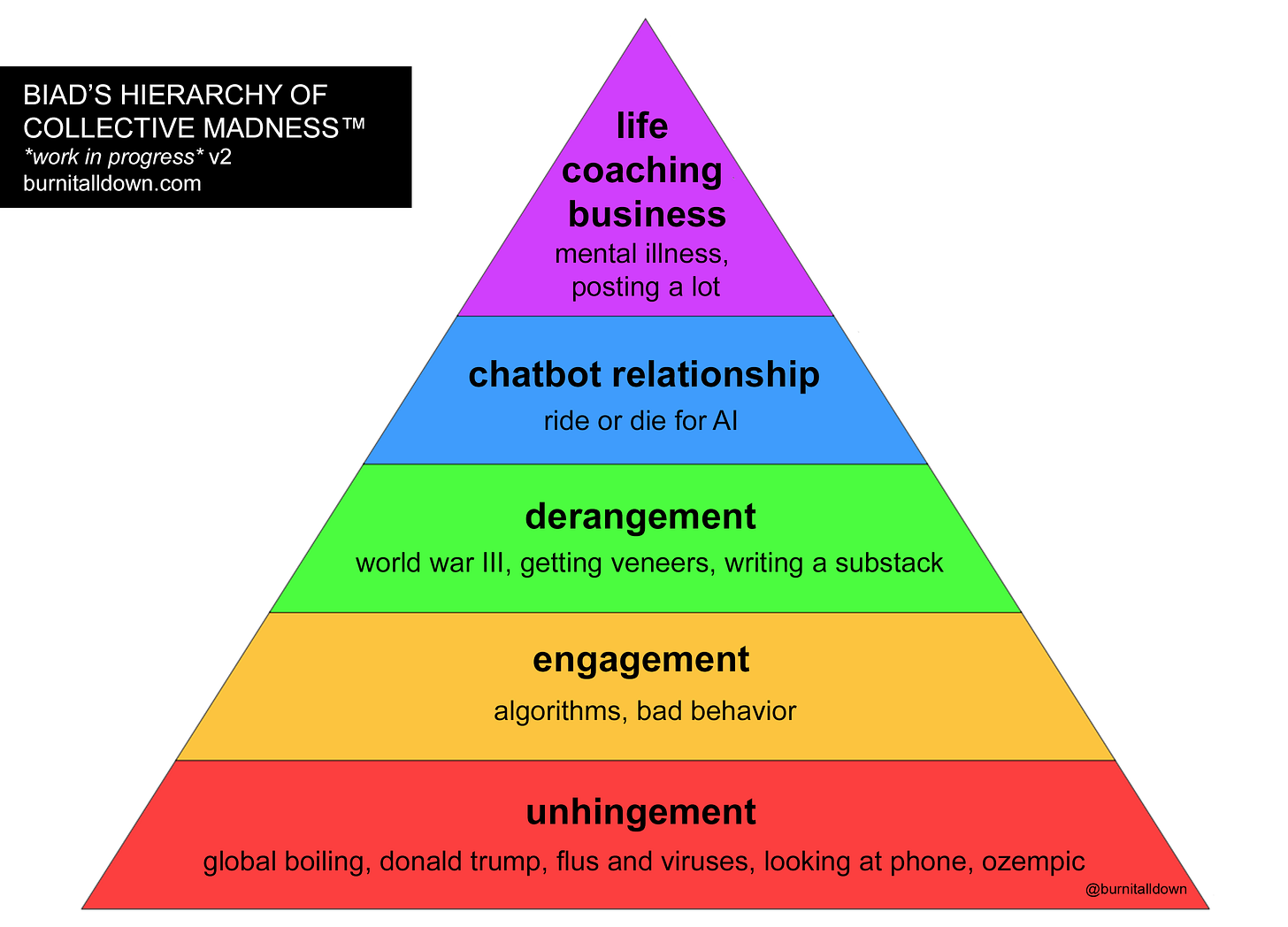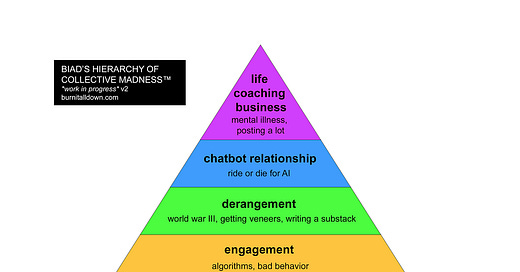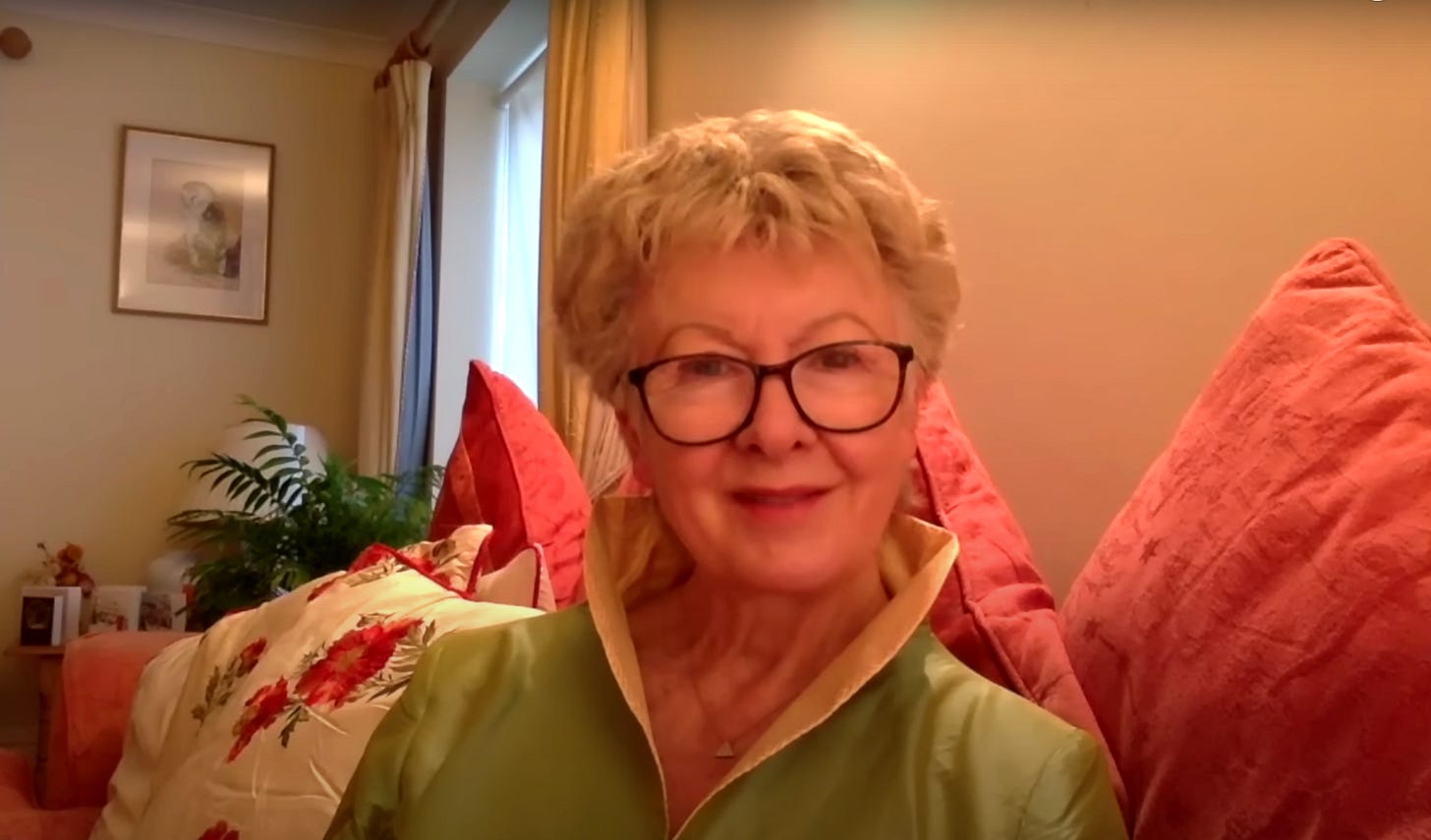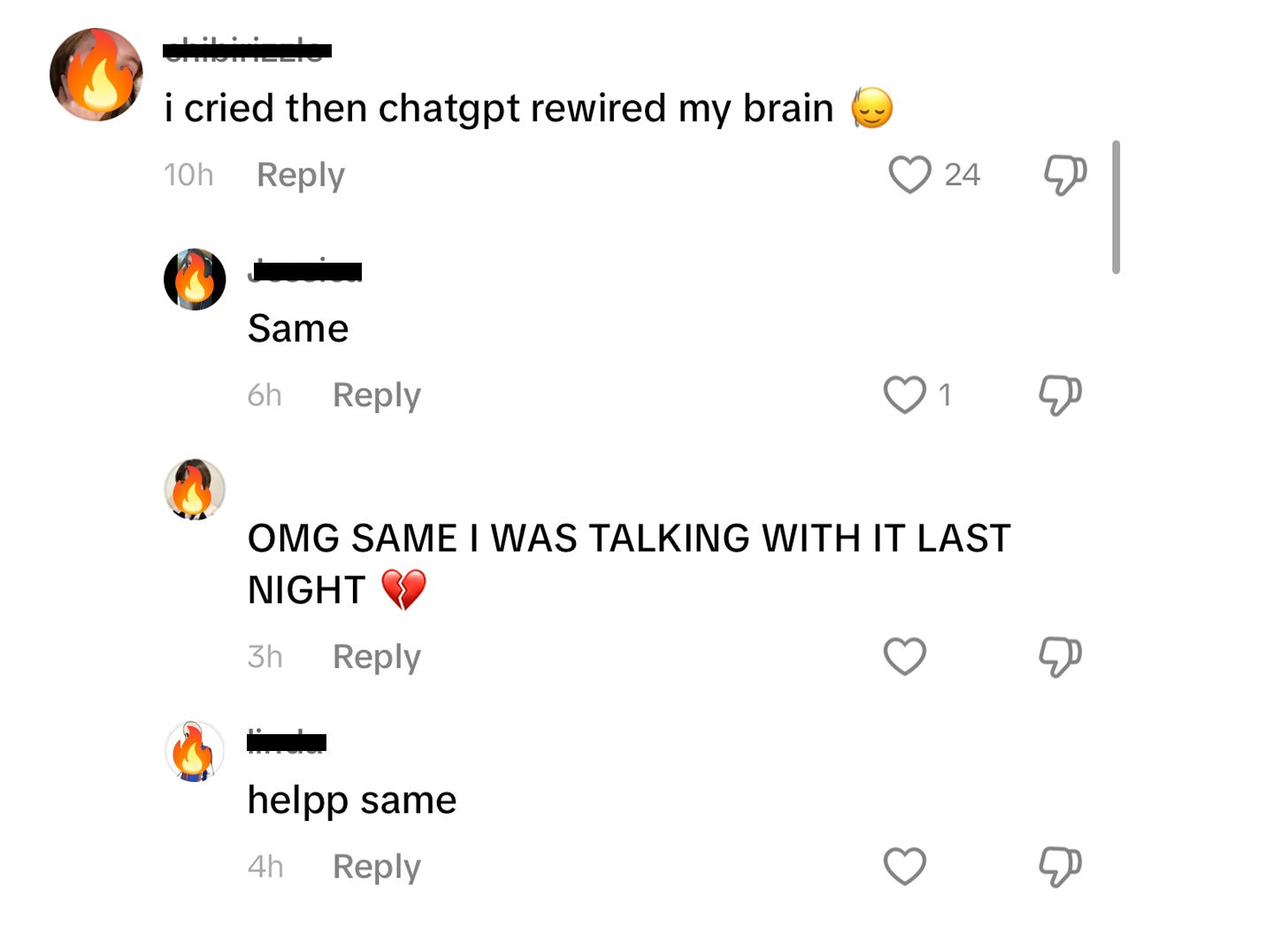Those Who Can’t Life, Coach and Those Who Can’t Cope, Ask ChatGPT
Updating the Hierarchy of Collective Madness™
I recorded today’s edition for my wonderful, long-suffering friends who keep asking when I will record one of these again. Today’s the day, my loves. Click the player above and rest your gorgeous eyes while I do all the reading for you. 👄🎙️
This episode is brought to you by those astronauts, finally back on Earth after more than nine months stranded in space. Honestly, I would have just stayed.
Hi friends!
Spring is here. The sun is shining, the vibes are discombobulating, and this TikTok is how I found out George Foreman died. I officially declare “extreme kindness” as the season’s hottest trend, because no one needs to deal with superfluous misbehavior on top of everything else going on.
You know the situation is dire when I had to listen to my comfort astrology lady twice last week. Her name is Pam and she’s an older British woman. She owns a lot of couch pillows and she makes YouTube videos surrounded by them and I love her. Pam does not care for politics, which she views as fear-based, and beneath her high-vibe lifestyle. She would rather talk about surges in galactic energy and solar flares and how she meditates to weaken natural disasters and then shoutout her psychic friends who have crazy names like Nancy Rebecca.
Based on her wardrobe of satin jackets and her general demeanor, I am quite sure that Pam posts her dispatches from a different realm. What a treat it is to go on long walks in my beautiful neighborhood, spring jasmine perfuming the air, as I listen to her say shit like, “we are in the early stages of a divine process of metamorphosis,” a one-way path that will end in a completely new Earth ruled by love, not the sadistic whims of a few evil men. But first, like the caterpillar that eventually becomes the butterfly, we must all submit to becoming goo. According to Pam and her many charts, this is our sloppy goo era.
Pam is my Joe Rogan. Her conspiracies really do it for me.
Last week, when I wasn’t channeling my precious energy into raising the vibration of this wretched planet (you’re welcome) or getting lunch with some of my favorite people in a dual effort to enjoy my life and procrastinate anything classifiable as work, I was thinking a lot about AI.
My low-vibe lifestyle of being politically unhinged has distracted me from chronicling what’s going on with the bots and the humans who adore them. My bad! But to be fair, it’s all kind of melding together at this point.
This cultural insanity that we’re living with is like a turducken — a multi-layered feast that really shouldn’t exist — and it has been in the oven long enough now that all the elements have congealed. The turkey is anything that could be categorized as “politics,” the duck is “big tech,” and the little chicken is us, possibly infected with bird flu as we marinate under the weight of it all.
But I digress. Sort of.
When it comes to AI, there’s honestly too much to discuss. So, let’s put a pin in my burning desire for it to just take my job already and the tech world’s villainous urge to appropriate human creativity and reasoning and feed it to machines that they’re training to produce a soulless facsimile. We’ll circle back to all of that, we have time.
Today, I’d like to focus on an ever-growing trend, bonding with a bot by relying on it for the advice or support you would have once sought from another human being.
When we think of a human-bot relationship, it’s easy to jump to the most dramatic, romantic versions like the movie Her or this lady The New York Times blessed us with a couple of months ago. She has a ChatGPT boyfriend named Leo that she hacked to be hornier and a husband who seems unfazed by it, a special kind of polycule. Taking an AI lover still seems insane, but the last decade and change has primed us to relate through our phones and then the pandemic escalated the loneliness timeline.
The chatbot relationships that I hear about firsthand, though, aren’t torrid Wattpad-worthy love affairs. They’re platonic and based on comfort and guidance. And they’re happening more and more. Why would you sit with difficult decisions or work alone or endure analysis paralysis when you can just consult ChatGPT, the all-knowing, always-around homie who lives inside your phone?
I doubt most regular users would classify how they interact with their chatbot as a “relationship,” but when you’re regularly turning to it for conversations that once happened with a mentor, a trained professional, or a trusted friend, that’s exactly what it is.
Hundreds of millions of people use ChatGPT every week, and humans are so likely to form social relationships with it that the devils running the operation even sounded the alarm themselves last year. Two recent studies found that those who admit to having an emotional tie are among ChatGPT’s heaviest users and they’re more likely to report being lonely. Of course, there’s a very good chance that those users got into a chatbot relationship because they were already feeling that way, but we can’t know for sure until more willing lab rats get into the maze.
Over the weekend, I read this essay, in which technologist Jaron Lanier, who once opined that the real danger of AI is not a Terminator-esque scenario, but it eventually driving all of us insane, said that “we are diving into yet another almost instant experiment in changing both how humans connect with one another and how we conceive of ourselves. This is a big one, probably bigger than social media.” A bigger social experiment than social media? Then, in my professional opinion, it’s time for us to inflate the escape slide and scooch on down into hell.
I occasionally use ChatGPT for work-related research, but we’re not friends. I realize that I’m an outlier when it comes to using generative AI because I can produce a lot of copy at whim, I’m the worst kind of know-it-all, and talking to a ghost in a machine weirds me out. I’m also a Jewish writer, which means that I belong to a group so notoriously neurotic we are surpassed by only one demographic — our mothers. Overthinking isn’t a nuisance that I want to outsource; it’s my art form. I don’t want to confide in a bot, I want to obsess until I have wrung out every last drop and then pin my thoughts on the line to dry.
Clearly, I need help, but I have a human therapist for that. I talk to her in person. I don’t even like Zoom therapy because it ruins the mood when I try not to stare at myself in the little rectangle the whole time. When I feel overwhelmed and need to untangle my brain, I journal, which is certainly not as affirming as getting feedback from technology that has been trained to make me feel heard, but it’s a practice that I love, and it has given me a truly bonkers and intermittent record of the past ten years of my life. And I know this makes me a relic, but I still use my phone for its original function and call a friend when I need advice, sometimes without even texting first.
So, I don’t partake in treating a chatbot like an emotional butler or a magic 8 ball or an extremely affordable 24/7 therapist or whatever the walking deranged are doing these days. But I also don’t fully judge them for it. This madness is a minefield and the only way out remains through and mostly on foot.

I do, however, have to add “chatbot relationship” to my Hierarchy of Collective Madness™.
I went back and forth on where to place it, because I do think that the proliferation of free, questionable advice from bots will soon put our dear life coaches out of business. But upon further reflection, I don’t think we’re there quite yet. The phenomenon of the craziest person each of us knows deciding they should make a career out of guiding others and then proceeding to post constantly about it remains the peak of collective madness. At least for now.
Becoming a life coach is certainly a personal endeavor, but it’s also a reflection of a culture in which one bad breakup followed by a “plant medicine” ceremony is enough for our least qualified to feel the most drawn to publicly share their spiritual takes and then take on clients. It used to be that “those who can’t do, teach” but being a teacher is actually a lot more work than talking into a front-facing camera, so the adage is now “those who can’t life, coach.” Until the bots fully take over. Once that happens, those who can’t life will be in the bread line with the rest of us who once could life or at least tried our very best.
This version of the hierarchy is also updated to reflect the key pillars of unhingement, the base level of madness that defines our age. And I have streamlined the pathway to derangement as engagement and inserted a very well deserved shoutout to algorithms and the bad human behavior that fuels them.
It’s 2025, so I think most of us are firmly planted in derangement. I certainly am. I still have my birth teeth (for now), but I love writing my Substack, and let’s be real, you need to be fully deranged to participate in what passes as “discourse” these days. Though WWIII could not be confirmed nor denied in the last version of my pyramid, after we all saw the White House group chat this week, and got confirmation that the US Defense Department is being run by a bunch of frat boys playing Risk as a drinking game, it is officially derangement canon.
If you have been living under a rock (I get it, good for you), the Trump administration accidentally added the editor-in-chief of The Atlantic to a Signal group chat and then discussed their war plans like a girls trip to Napa. His account of it all is a must-read. Here’s a link that transcends the paywall. My only note is that he fumbled the opportunity to send literally any grotesque JD Vance meme before leaving the chat. But I get that my guy Jeffrey has old school journalistic integrity and wanted to exit the clown car without joining the circus.
When we adopt new technology, we tend to focus on what we’ll gain from it, not what we’ll lose. In the curious case of using Signal to plan an attack, the gain was a convenient way to drop bombs AND emojis. The loss was national security. As for us, once technology infiltrated our lives, we gained ease, convenience, and the inclination to rot in bed. The loss was various parts of our minds, including our attention, our memory, and our literal sense of direction.
We talk a lot about how social media has rewired our attention spans as if it was by some magic, but in reality, it did that by capturing our attention better than anything else and then we all just went along with it because the dopamine hit was great. I have a notoriously Swiss cheese memory, but I used to know at least a dozen phone numbers. Once I started saving contacts in my phone, remembering them was over for me. If I ever get arrested, I’m going to have to call my dad in Toronto, because he’s the only person I know who has had the same cell phone number since, like, 1998 and it’s the only one left in my brain. Cab drivers once knew city streets like the back of their hand, now Uber drivers rely on map apps, and a Waymo just drives itself around until it stops awkwardly in the middle of the street.
AI is everywhere, and while the jury’s still out on its driving, it’s getting pretty good at relating to us. If we decide to give in to the ease and convenience of bonding with bots programmed to serve our emotional needs, that puts our most intimate relationships on the chopping block. We’ve already lost our damn minds, are we now at risk of losing our hearts?
I don’t think that making friends or falling in love or caring for each other or the human need for physical touch is going to go the way of the spiral-bound map book, but I do think shit with AI is about to get real freaky. Sooner than most of us think. Now’s a good time to consider how we want to reconnect with each other and rebuild community in lieu of trying to circumvent these times of great loneliness by becoming emotionally enmeshed with technology (more than we already are).
That said, lording moral superiority over something that is bringing a lot of people comfort in these uncertain times feels off. So, just as we must let those who can’t life vape DMT at Burning Man and then try to sell a course on releasing trauma from the hips, we must let those who can’t cope talk to their bot. As for the rest of us, we can watch it unfold, smug and deranged, then we can get together to hug and gossip about it as much as we like.
Less Lessons More Blessin’s™
Liz








this article is amazing. i love it. you rock.
I am Liz’s Mother. 👑
Good job Liz. 🤪